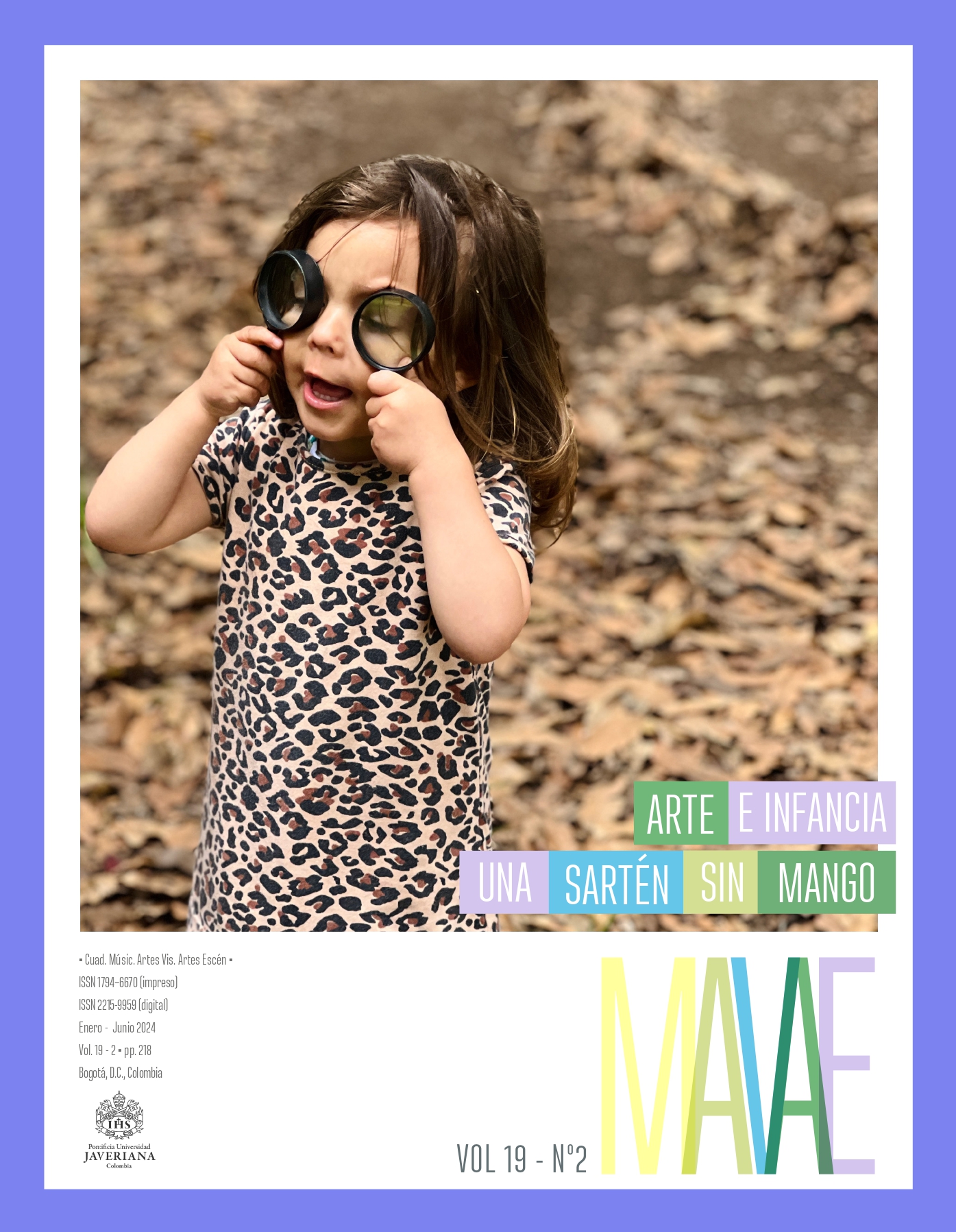Abstract
The article explores children’s political subjectivities from their social and urban participation in the neighborhood of Brisas del Volador (Ciudad Bolivar, Bogota), within the framework of the study on the experience of children and teenagers growing
up in cities, Growing Up in Cities III. It is the third version of an original study by the famous urbanist Kevin Lynch in the 1970’s, and a second version by Louise Chawla in 1990. This version is led by the teachers of the Deakin University (Australia), and
it is developed in 16 countries and 24 cities. The research in Bogota was carried out in Brisas del Volador. Using artistic methods, the recognition and mobilization of their appropriation of urban space, as well as their political subjectivities in terms of
identity construction and positioning in relation to their environment, was proposed. As a result, we found that the expressive power of the methodology based on the artistic workshop facilitates a reflection on environmental conditions, appropriation
of public space and involvement in the solutions to the problems that concern them. The children of Brisas del Volador actively construct social meanings and participate with enthusiasm to transform their environment. They feel differentially able to influence,
according to the complexity of the problems, but never anchored in impotence. On the contrary, they permanently cultivate hope.
Alderson, Priscilla. 2013. Childhoods Real and Imagined. Volume 1: An Introduction to Critical Realism and Childhood Studies. Londres:
Routledge.
Bruner, Jerome. 1997. La educación, puerta de la cultura. Madrid: Visor.
Bruner, Jerome. 1998. Realidad mental y mundos posibles. Barcelona: Gedisa.
Caicedo Moncada, Juan Pablo. 2020. Subjetividades políticas en la niñez:Sistematización de la experiencia del Movimiento Nacional de Niños,
Niñas, Adolescentes y Jóvenes Gestores de Paz. Por un hoy y un mañanadiferentes [tesis de maestría, Pontificia Universidad Javeriana].
Pablo%20Caicedo.pdf?sequence=1&isAllowed=y
Cele, Sofia y Danielle van der Burgt. 2015. “Participation, Consultation,
Confusion: Professionals’ Understandings of Children’s Participationin Physical Planning”. Children’s Geographies 13, n.º 1: 14-29. https://
doi.org/10.1080/14733285.2013.827873
Chawla, Louise. 1997. “Growing Up in Cities: A Report on Research Under Way”. Environment and Urbanization 9, n.º 2: 247-252. https://doi.
org/10.1177/095624789700900212
Díaz Gómez, Álvaro. 2012. Devenir subjetividad política: Un punto de referencia sobre el sujeto político [tesis de doctorado, Centro de
Estudios Avanzados en Niñez y Juventud]. http://biblioteca.clacso.edu.ar/Colombia/alianza-cinde-umz/20130401053108/TesisAlvaroDG.pdf
Frank, Kathryn I. 2006. “The Potential of Youth Participation in Planning”.Journal of Planning Literature 20, n.º 4: 351-371. https://doi.org/10.1177/0885412205286016
Freeman, Claire y Paul Tranter. 2011. Children and Their Urban Environment: Changing Worlds. Londres: Earthscan.
Freeman, Claire, Karen Nairn y Judith Sligo. 2003. “‘Professionalising’ Participation: From Rhetoric to Practice”. Children’s Geographies 1,
n.º 1: 53-70. https://doi.org/10.1080/14733280302182
González, María Isabel, Alcira Aguilera y Alfonso Torres. 2014. “Investigar subjetividades y formación de sujetos en y con organizaciones
y movimientos sociales”. En Acercamientos metodológicos a la subjetivación política: Debates latinoamericanos, comp. por
Claudia Piedrahita Echandía, Álvaro Díaz Gómez y Pablo Vommaro, 49-70. Bogotá: Universidad Distrital Francisco José de Caldas. https://biblioteca.clacso.edu.ar/clacso/gt/20140425024728/AcercamientosMetodologicosALaSubjetividad.pdf
Graham, Anne y Robyn Fitzgerald. 2010. “Children’s Participation in Research: Some Possibilities and Constraints in the Current Australian Research Environment”. Journal of Sociology 46, n.º 2: 133-147. https://doi.org/10.1177/1440783309355065
Hernández-García, Jaime. 2016. “Hábitat popular: ¿Un modo alternativo de producción de espacio para América Latina?”. Estética de los
mundos posibles, inmersión en la vida artificial, las artes y las prácticas urbanas, ed. por Iliana Hernández García, 245-258. Bogotá:
Pontificia Universidad Javeriana. https://issuu.com/pujaveriana/docs/estetica_de_los_mundos_posibles_-_s
Lynch, Kevin, ed. 1977. Growing up in Cities: Studies of the Spatial Environment of Adolescence in Cracow, Melbourne, Mexico City,
Salta, Toluca and Warszawa. Cambridge: MIT Press.
Malone, Karen. 2015. “Children’s Rights and the Crisis of Rapid Urbanisation Exploring the United Nations Post 2015 Sustainable Development Agenda and the Potential Role for Unicef’s Child Friendly Cities Initiative”. The International Journal of Children’s Rights 23, n.º 2: 405-424. https://doi.org/10.1163/15718182-02302007
Marcus, George E. 2018. “Etnografía multisituada: Reacciones y potencialidades de un ethos del método antropológico durante
las primeras décadas de 2000”. Etnografías Contemporáneas 4, n.º 7: 177-195. https://revistasacademicas.unsam.edu.ar/index.
php/etnocontemp/article/view/475/444
Ospina Serna, Héctor Fabio, Sara Victoria Alvarado Salgado, Patricia Botero Gómez, Jhoana Alexandra Patiño López y Marta Cardona
López, eds. 2011. Experiencias de acción política con participación de jóvenes en Colombia. Manizales: Centro de Estudios
Avanzados en Niñez y Juventud. https://repository.cinde.org.co/handle/20.500.11907/35
Piedrahita Echandía, Claudia Luz. 2014. “Reflexiones metodológicas: Acercamiento ontológico a las subjetivaciones políticas”.
En Acercamientos metodológicos a la subjetivación política: Debates latinoamericanos, comp. por Claudia Piedrahita
Echandía, Álvaro Díaz Gómez y Pablo Vommaro, 15-30. Bogotá: Universidad Distrital Francisco José de Caldas.
Tanaka, Martín. 1995. “Jóvenes: Actores sociales y cambio generacional. De la acción colectiva al protagonismo individual”.
En Perú, 1964-1994: Economía, sociedad y política, ed. por Julio Cotler, 149-165. Lima: Instituto de Estudios Peruanos. https://
www.verdadyreconciliacionperu.com/admin/files/libros/632_digitalizacion.pdf
Tisdall, Kay M. 2008. “Is the Honeymoon Over? Children and Young People’s Participation in Public Decision-Making”. The International Journal of Children’s Rights 16, n.º 3: 419-429.
Tovar-Guerra, Claudia. 2019. “Subjetividad política para la vida y liderazgo juvenil: Una iniciativa de paz desde el territorio”.
Psicología política y procesos para la paz en Colombia, ed. por Álvaro Díaz Gómez y Omar Alejandro Bravo, 201-244. Cali: Universidad Icesi. https://repository.icesi.edu.co/biblioteca_digital/handle/10906/84683
Unicef (United Nations Children’s Fund). 2012. Cities and Children: The Challenge of Urbanisation in Tanzania. Nueva York: Unicef.
https://www.childwatch.uio.no/news/2012/cities-and-children_tanzania.pdf
Wilks, Judith y Julie Rudner. 2013. “A Voice for Children and Young People in the City”. Australian Journal of Environmental Education
, n.º 1: 1-17. https://doi.org/10.1017/aee.2013.12

This work is licensed under a Creative Commons Attribution 4.0 International License.
Copyright (c) 2024 Claudia Tovar-Guerra, Isaac Salgado, Jaime Hernández-García


